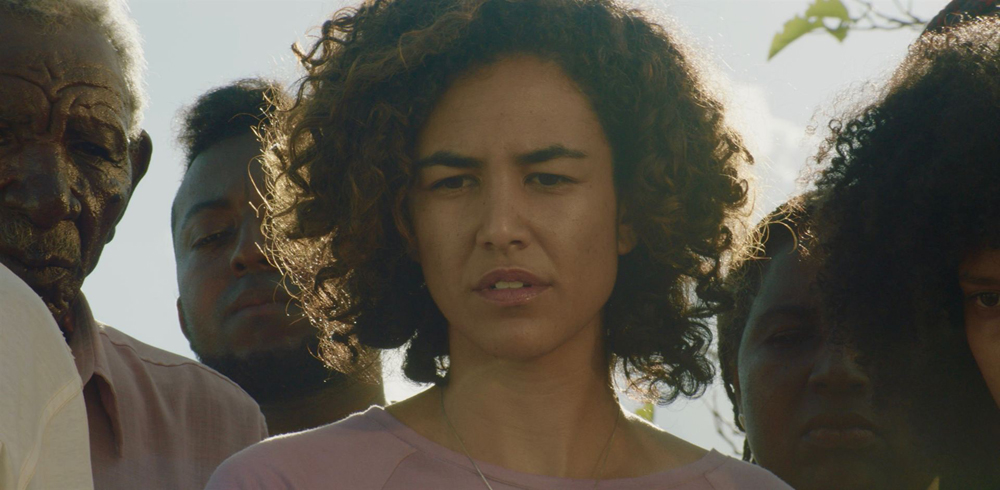The school in the fictional village of Bacurau, located somewhere in the desert hinterlands of north-eastern Brazil, bears the name of one João Carpinteiro. If the throbbing synth track that introduces the opening credits, the film’s glorious widescreen photography, and the narrative’s Rio Bravo-indebted premise weren’t sufficiently indicative, Google Translate helpfully confirms that in English the name does indeed translate to that of the author of Assault on Precinct 13. Credit where credit’s due, as Bacurau owes a considerable debt to Carpenter–while also taking ample cues from another half-dozen genre auteurs–but in terms of complexity and ambition, this furious political allegory co-written and directed by Kleber Mendonça Filho and Juliano Dornelles (the production designer on Mendonça Filho’s previous features) is very much a case of the students outclassing the master. 
Following a title card that reads “A few years from now…,” the population of Bacurau is introduced as a close-knit and self-sufficient community managing to survive on extremely limited resources. As if it were plucked straight out of a Western, the tiny village comprises two rows of houses lining both sides of a dirt road. There is a doctor (played by a gaunt and fierce Sônia Braga as the very opposite of her sophisticated bourgeois dame in Aquarius), a school, a (disused) church, even a brothel, but no sheriff–in fact, famed outlaws live there undisturbed, their exploits celebrated in YouTube clips that the children love to watch on their smartphones. The inhabitants’ deep-seated hostility towards the government is revealed when Tony Jr. (Thardelly Lima), the politician who cut off their drinking water, arrives and attempts to buy their votes for the upcoming elections with supplies of expired food and phony medicine. Locked up inside their houses, they hurl abuse at him through the shutters, expressing in no uncertain terms that his ilk is not welcome there.
Then, slowly, odd things start happening. Phones don’t get reception anymore. The village no longer shows up on satellite maps. A UFO is seen flying through the air. And thus starts the siege of Bacurau by a group of American tourists, led by Michael (Udo Kier, irresistible as ever), who have paid Tony Jr. good money to hunt down and murder the population in a vaguely defined contest. Little do they know that Bacurau, chosen because of its size and remote location–a place that could literally be wiped off the map without anyone taking notice–is not only home to the aforementioned outlaws, but also to an older generation of former revolutionaries, and that a massive arsenal lies buried below the town square. What follows is an uproarious, drug-fuelled and inordinately bloody historical revenge fantasy where, for once, it’s the little people of Brazil who come out on top.
The broad allegorical strokes of a story about the Brazilian government selling its poorer citizens to blood-thirsty Americans will be evident to anyone aware that the country was once ruled by a U.S.-abetted military dictatorship. Reminiscent of Christian Petzold’s strategy in Transit, Mendonça Filho and Dornelles have set Bacurau in a near future that, a few technological gadgets notwithstanding, very much resembles the past, collapsing history to condemn a present wherein a leftist government with egalitarian ambitions has once again been deposed and replaced with its nightmare opposite.
Although many of the finer points were lost on me–the narrative is charged with a wealth of cultural allusions and historical references unlikely to be picked up on by non-Brazilian viewers–this lack of context didn’t at all diminish my enjoyment of the film. In fact, it only fed into the confusion that is essential to the narrative’s construction. Replete with non-sequitur sequences and absurd vignettes, much of the plot is purposely disorienting, if not wholly inexplicable. It might seem an odd departure for the makers of the crystalline Neighbouring Sounds and Aquarius, but it feels all too appropriate when one considers that, unlike its more focused predecessors, Bacurau confronts a reality that is violently nonsensical.
Bacurau premiered at the Cannes Film Festival and opens on March 6.

